Best Water Softeners
* If you purchase through a link on this post we may receive compensation
The best water softener systems will increase the lifespan of your clothes, improve your plumbing, and protect your appliances. Is your skin always dry and itchy? Are your sinks and shower areas riddled with stains? Are your clothes looking dingy and soiled despite having just been washed? If so, then you probably have a problem with hard water.
If your water contains 60 mg or more of dissolved magnesium and calcium it’s considered hard. In some places the water can have as much as 180 mg of these substances, and it’s often really tough to eliminate.
It is critical to ensure that your water is soft enough. With thousands of products available, we’ve created this piece to draw your attention the best water softeners on the market.
Best Water Softeners
Below we provide in-depth water softener reviews so you can find out more about the top models.
Fleck 5600SXT 48,000 Grain Water Softener
This complete, whole-house water softening unit has a high-efficiency Fleck 5600SXT Digital ‘On-Demand’ control valve. It also uses high-capacity extra long-life resin, as is prevalent in all of the Fleck water softening systems.Hard water is removed using an ion-exchange process that removes the magnesium and calcium that cause hard water. By eliminating this hard water, you will extend the lifespan of all your plumbing and appliances.
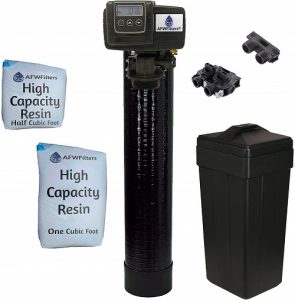
This water softener system uses a meter-based regeneration process. This measures all the water that you use and only regenerates when necessary. If your water needs increase, the system will automatically regenerate more often to meet your demands.The valves on these systems have a 5-year warranty and have been tested to work continuously for up to 27 years!
Pros
- Backlit LCD Display.
- 48-hour internal backup power.
- Durable tank with a 10-year warranty.
- Short installation time with only basic plumbing skills needed.
Cons
- Resin has been known to clog peoples plumbing lines in some instances.
- Complicated user interface.
iSpring ED2000 Water Conditioner (Best Water Softener for Well Water)
This product is ranked as one of the best water softeners by The Spruce and MSN. Its popularity is mainly because it costs less than many of the cheapest salt-based chemical softeners available.Petite and inexpensive, this water softener is also easy to install. You simply wrap the coils provided around your pipe, plug the device in, and your descaler is in immediate operation.
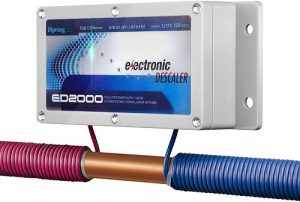
This device uses electromagnetic force. This means that you’ll never have to worry about noise from machine regeneration or spend money replacing salt every few months.Most users have claimed to notice immediate improvements. Bathtub rings, toilet stains, and showerhead scale buildup have suddenly vanished. Others have claimed that their skin irritation has improved and that their hair and body soaps lather better after purchasing and using the iSpring ED2000.
Pros
- Easy installation
- Salt-free, chemical-free
- No maintenance needed
- Affordable
Cons
- Effects are not backed by scientific proof
Whirlpool WHES30E 30,000 Grain Softener (Best salt water softener)
This particular water softener is ideal for households of 1-4 people and can remove up to 8ppm of clear water iron.It’s NSF certified to decrease hard water symptoms like the buildup of scale on plumbing and faucets, spotting on dishes, and stains on clothing.Whirpool is an excellent brand, and their water softeners automatically calculate how much saltwater is needed to regenerate, only using the necessary amount to balance out your water. This leads to significant savings in water and salt over time.This model comes with full 1-year parts and labor guarantee. However, this can be extended if you purchase three bottles of Whirlpool WHEWSC water softener cleanser.The WHES30E is also designed, assembled, and engineered in the USA.
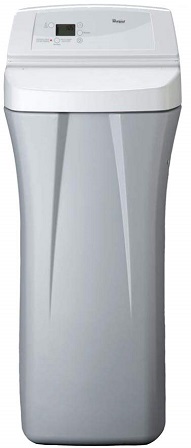
Pros
- Trusted and popular brand.
- Extendable one-year parts and labor warranty.
- Salt light indicator included to let you know when to top up salt levels.
Cons
- Some customers claim the hardware only lasts around 18 months.
ABCwaters Built Fleck 5600sxt
Are you in the market for a top-tier water softener system for the entire home? If so, this option from ABCwaters is a great choice because it’s affordable and it gets the job done.Part of the reason it’s so effective is because it has the Fleck 5600SXT, which is a digital valve, and it’s really popular because it helps lower your overall power consumption.
It also has a 48000 grain capacity and this system is designed to remove the largest culprits that create hard water.
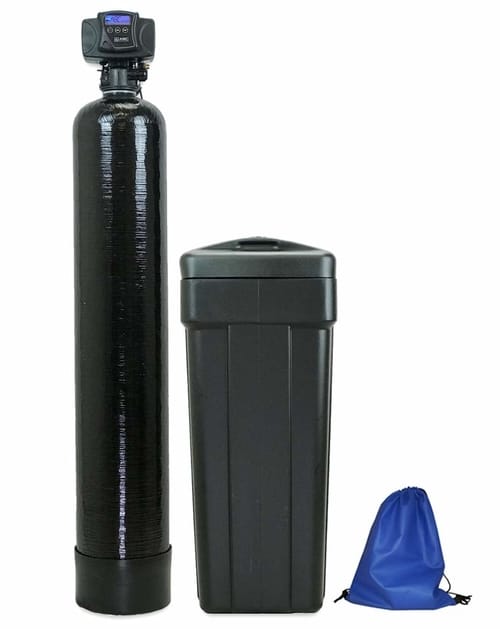
Keep in mind that this filter is designed for softening water. If you have too much iron or other trace minerals in your home, you’ll also need an additional whole house filter that handles those types of contaminants.Other benefits include a 10 year warranty, two preloaded American-made tanks, the kit, the installation videos, and an easy-to-follow installation guide. Plus, if you do run into problems during installation their technical support team can help you overcome them.
Fleck Iron Pro 2
This water softener is even better because it not only filters the calcium and magnesium; it also filters out the unwanted iron from the water and the price is absolutely tremendous as well.First, this is a 64,000 grain unit. Even better, it is fully equipped with the Fleck 5600 SXT, which is excellent for its power saving abilities because it consumes much less energy than typical models. It’s also very easy to use and not only does it remove calcium, magnesium, and iron, it can also removes sulfur, sediment, and rust up to 2 ppm.Lastly, this filtration system comes with a plastic cone and a bypass valve. The instructions for installation aren’t very easy to follow unfortunately, and even the most experienced technicians might have trouble figuring them out. So your best bet is to hire a professional to install the unit just to make sure it is set up properly. The system lasts long though, so that’s a plus, and you will not have to replace it for decades.
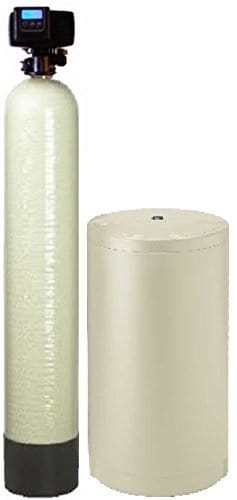
Bullet Poly Triple Action
We definitely consider the Bullet Poly Triple Action one of the top water softeners of its kind. And for good reason because it’s reliable, practical, and compact. What makes it really stand out is it is salt free, so you don’t have to worry about calculating cubic feet or resin. It’s also a waterproof device so you can install it outside of your home and it will never freeze.Some of the wonderful features include the BPA free plastic body. The media is also completely replaceable and it even has a mounting bracket inside the box, so you will not have to buy one separately.
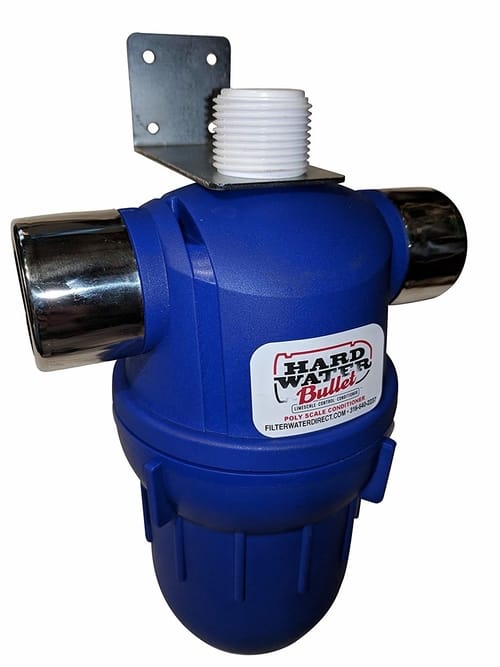
The product functions reasonably well and problems are usually few and far between. But best of all, it reduces limescale and removes calcium carbonate. It does not remove chloramine unfortunately and it doesn’t filter for iron either.Another thing to consider is the connector. It’s only 1 inch in diameter, so you may need more than that. Bullet Poly also offers a five year guarantee which is a nice bonus.
Aquios FS-220 Salt-Free Water Conditioner
This particular water softener is very small. In fact, it’s the smallest water conditioner available on the market today. But size isn’t an issue in this case. And the price is outstanding, which makes this water conditioning system an incredible value.You’ll love this filtration system because it uses a carbon filter and it is also salt free. So it’s going to filter resin, chloramine, calcium, magnesium, and other unwanted particles, which makes this device an incredible value.Thankfully, this filter is so effective that you’ll have softer water, it’s going to taste incredible, and it’s even going to be very pure because of all of the filtration. And the size is great because you can install it just about anywhere because it’s so small.
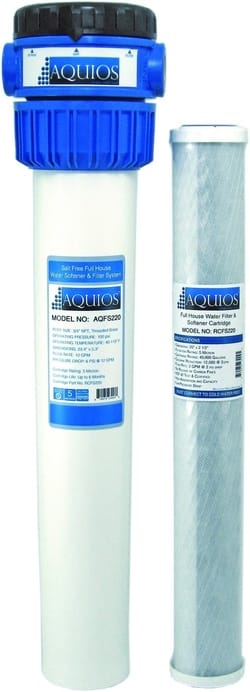
On the other hand, this system comes with three-quarter inch inlets and a mounting bracket. So it’s highly doubtful that you’ll need additional connectors. The filters, on the other hand, need to be replaced periodically because they can clog up the system.Moving on to the negative, the whole housing isn’t made of the strongest material. Unfortunately, it is even known to leak from time to time. So if you have very heavy water, this might not be the best option. Then again, this system is simple to install, it’s very affordable, and it does perform admirably even with its occasional flaw.
Nuvo H20 DPHB
This water softener is a solid, efficient option. It’s not going to win awards any time soon, but it’s basic and reliable and it gets the job done at a relatively low price.It’s a salt free unit which many people find appealing. It can reduce corrosion and make your water taste much better.
And everything you need to mount the unit is available in the kit and it even features a bypass valve.The water flow rate is 12 to 15 GPM. It’s very easy to install, but it does have 1 inch inlets, so keep this in mind and remember to measure your pipes.
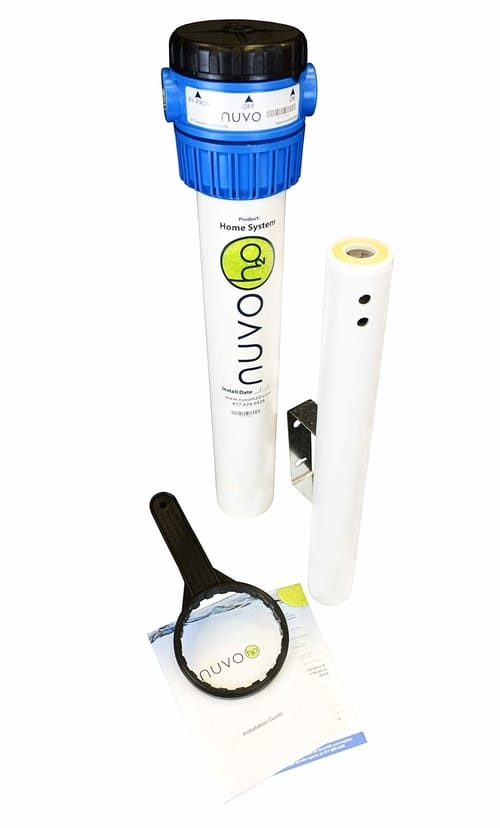
Fleck 9100 SXT
The Fleck 9100 water softener is particularly wonderful because it’s very effective and its capacity is huge.
It’s a heavy duty model that has two tanks and each of their tanks have 96,000 grain capacity, which is very large. So it’s going to function at the top of its game.Not only does each tank have a 10 year warranty, they also come with 3 ft.³ of resin per tank which will last for about five years.
So it’s a bit on the heavy side but it’s going to pay big dividends because of its longevity.
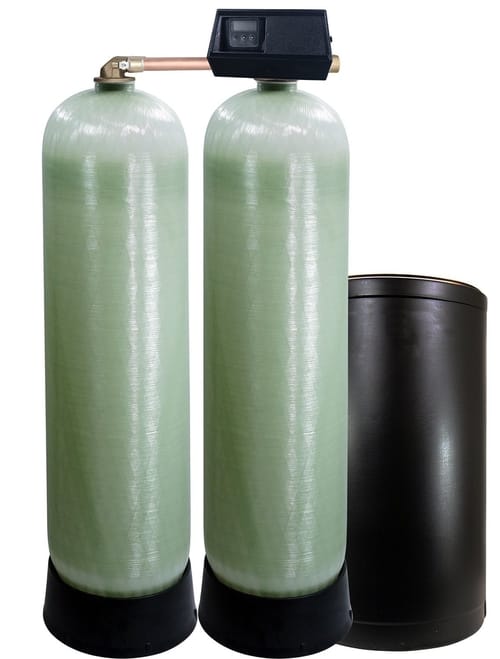
The dual tanks come preloaded with resin which is very convenient. It has a control valve, so you can bypass the softener when necessary. There is a prime line available for the brine tank and connection is very easy.As far as effectiveness goes, it removes the ions that cause hard water and it even eliminates the potential threat of scale buildup. It can even remove iron as well and it has a very powerful flow rate at 20 gpm max.It even excels with control and efficiency because of the Fleck digital metered head. Just remember that it’s a very large unit so you’re definitely going to need additional space to accommodate it, so keep that in mind.
Eddy Water Descaler
As far as we can tell, the Eddy Water Descaler is one of the simplest solutions to solve your limescale buildup problem and it’s also very easy to maintain.
It’s electric, which makes it very efficient and it also produces electromagnetic waves that stop the scale from clinging onto your pipes.
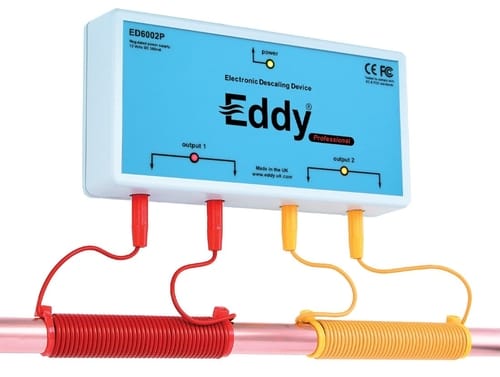
This unit might not necessarily soften your skin or even your water, but it’s going to get rid of the limescale buildup because that’s its job and that’s exactly what it was designed to do.It’s very easy to install and the product comes with four wires. Since it doesn’t attach to a pipe or the plumbing, it can be installed very easily and it’s cheap to maintain it as well.Never, and I mean never mount this outside. It’s electronic so you could get electrocuted or you may just end up damaging the unit. Technically speaking, this is not an actual water softener; it’s more like a conditioner, so keep that in mind.
Tier 1 Digital
Tier 1 has some very positive attributes along with its ability to provide solid results. It’s effective, it’s small so it saves space, and you can even install it outside – but only if you live in a warm climate and the temperature doesn’t drop below freezing.Inside the set, you’ll have everything you need to install it. The unit has an LCD display which makes it very convenient, and the Fleck 5600 SXT allows you to fully control the cycles of regeneration.
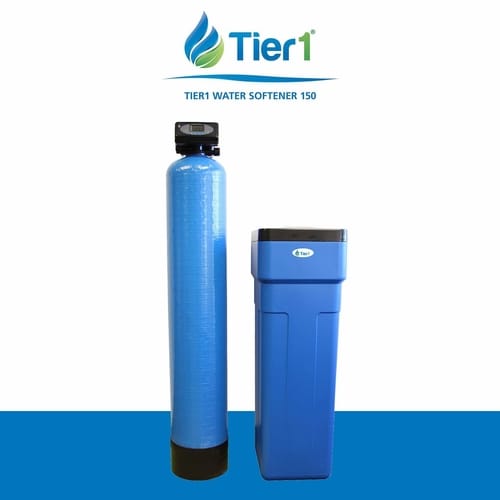
Its grain capacity is only 48,000, which unfortunately isn’t perfect. But it will eliminate magnesium and calcium phosphate without any trouble. It’s just not going to remove other potentially harmful minerals other than limescale, which it could potentially remove in its entirety. If not, it will significantly reduce the problem.This product isn’t going to create miracles, so don’t expect it to. But it’s inexpensive and it does soften hard water admirably. So it’s definitely excellent in that regard.
Morton System Saver
For those looking for a compact and efficient water softener and have modest needs, the Morton System is an excellent choice. It’s pretty small at 17 inches wide and 43 inches tall, yet it packs a powerful punch.This water softener can remove iron, believe it or not, but you must use the right salt. It also cuts down on limescale, soapy buildup, and water spots too.
And even better, if you install it and add the Morton Rust Remover, you’ll be able to remove even more contaminants.
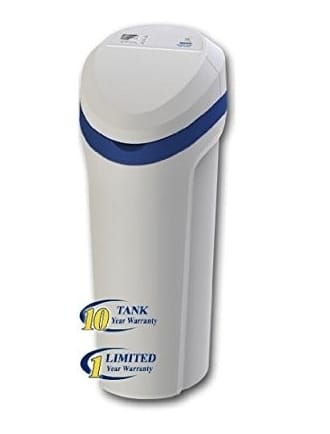
It’s a 30,000 grain unit which might not be efficient for everyone, so keep that in mind. But it’s made with the latest technology that can predict your water spend and plan the next regeneration cycles based on this information.It also has a built-in bypass valve, which is certainly helpful during regeneration cycles. Some people say that it’s very tricky to install and others say that it could potentially leak. If you aren’t too handy, hiring a professional to install it might be your best option.
Why You Need a Water Softener
Generally speaking, most municipal water supplies contain a wide range of minerals that make the water hard. To be more specific, hard water is water that contains an overabundance of iron, magnesium, calcium, and other unwanted minerals and particles.
The Negative Side to Hard Water
Unfortunately, having hard water is going to lead to inconveniences and it could even bring about the onset of physical diseases. So you’ll have to maintain your water supply as well as keep your pipes and faucets thoroughly maintained too.
Hard water unfortunately causes numerous problems. They are:
- Skin issues – this water makes your skin feel itchy and dry.
- Limescale build up – limescale from minerals can build up on your showerheads, fixtures, pipes, and appliances that can create significant deterioration.
- Hard water traces – hard water will leave behind soap scum on bathroom fixtures, faucets, and dishes and it also leaves behind a cloudy film as well.
- Laundry problems – the overabundance of minerals will create laundry problems meaning your laundry will feel stiffer than usual and you may even notice white spots on your clothes.
- Corrosion – this can definitely occur along with rust.
- Lather troubles – believe it or not, hard water makes it very difficult for shampoo, soap, and other similar products to produce a nice lather or foam.
- Water heater worries – water heaters work very inefficiently due to hard water and it could even damage the unit.
Now you truly understand the potential problems caused by hard water. We’ll now look at water softening in greater detail so you can truly understand the biggest benefits.
Water Softener Benefits
These benefits present more than simple conveniences because they provide excellent healthcare results and they are even friendly on your budget. In no particular order, the benefits include:
- Prolong the life of your appliances – without limescale buildup your appliances will function better and last much longer before they need to be replaced.
- Improve energy efficiency – not only will your appliances last longer, you will also use less energy when operating them. Your heating bills should remain lower as well, which is definitely positive because heating bills can become very expensive during cold winters.
- Stain free surfaces – by eliminating hard water, you are eliminating the cloudy residue that has a tendency to build up on your surfaces. Not only that, but your faucets are also going to remain very shiny and they will have a glossy look, which is very attractive to say the least.
- Detergents and soaps function better – when you have soft water in your home, your detergents and soaps actually work better so you’ll need less of them to build up a lather or foamy substance to clean clothes, hands, bodies, and more.
- Softer hair and skin – just like with your clothes, your skin and hair is going to be a lot softer because soft water is much gentler than it’s harder counterpart. So not only will you look better, you’ll also feel a lot better too which is certainly a good thing.
The Best Types of Water Softener Systems Based on Popularity
- Salt free water softener – Salt-free systems utilize nano-technology to transform the atomic structure of water and soften it up. If limescale has already started to build up your home plumbing system, this form of water softening efficiently removes this from the plumbing so that the situation doesn’t worsen.The running costs of salt-free systems are generally lower, and easy to maintain. Additionally, they have the advantage of not needing to be installed near a drain. They are considered eco-friendlier, but they can be ineffective in totally removing all of the hardness from your water.
- Salt based water softener – Salt-based water softeners use salt to replace hard water ions, resulting in a softening of the water. These units use a tank for resin beads and a brine tank or salt chamber, which must be topped up to keep the machines running efficiently.A process called ‘regeneration’ refreshes the resin beads and in turn, softens the water. These models are typically low-maintenance, as they usually are timer or meter-based. However, they are often relatively large and must be installed close to a drain so that all wastewater can be efficiently drained.
- Magnetic water descalers – For those that have small apartments or want to save space, electromagnetic systems are the most minor units available. They work by placing magnetic wires around water pipes, changing the structure of water molecules, and softening the water. These systems are perfect for low to medium-hard water and are also environmentally-friendly. They are also easy to install and low maintenance, as well as being inexpensive to run.
- Dual tank Water softeners – this is a very big unit to say the least, so if you have a major need for water in your home that needs to softening, you’ll definitely want to go with such a large option. This is a heavy duty system and it’s necessary if your household consumes a great deal of water. Ultimately, this system is going to give you soft water no matter what time of the day it happens to be. It regenerates the resin during the night or immediately after it processes a few gallons of water. While it’s regenerating, your water is going to completely bypass the soft water system, so you cannot use the water at this time so remember this. But once the regeneration finishes, the unit will begin functioning again and start processing your water. This is a bigger investment than anything we’ve mentioned so far, but it provides amazing results and it’s an excellent long-term solution.
Tips for Choosing The Right Water Softener
Throughout this section we’ll share expert tips and teach you important information so you know what to look for ahead of time before buying a water softener. So if you are about ready to buy a new water softener, please read this info thoroughly to help you make the right choice for your home.
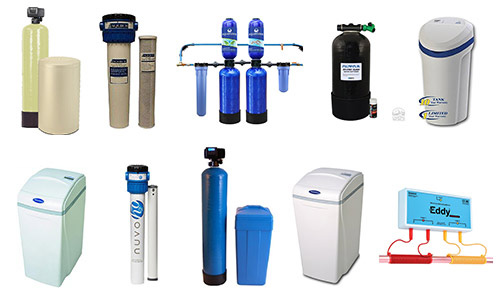
Before diving in headfirst with our comparisons, it’s best to share some general tips and practices for the task ahead. These powerful insights will play a significant role in helping you choose the right system. So please take this information to heart and use it before making your next purchase.
- Is it a one-piece or a two-piece water softener? Basically, you’re much better off using a two-piece because it’s the right choice. But you might not have enough space to fit the system, so keep that in mind as well. Two-piece softeners are often cheaper. Plus, they typically keep the electronic portion of the device separate from the brine tank which is a good thing because brine is corrosive.
- Who are you buying the water softener from? Buying a system from a local dealer is certainly a wise choice. They typically know the water source in the area much better than anyone else, so they’ll be able to help you choose the best system based on your specific needs and requirements. They will also discuss your options with you in person before making a purchase, and this will help you decide on the right choice. Plus, if you need additional assistance, your local dealer will be able to help you, often in person.
- Is the system easy to maintain? Obviously if previous customers complain that the water softener system is difficult to maintain, you may not want this option. As an example, if you need to take apart the entire system just to replace the filter, this is clearly a difficult system to use and there are much better options to choose instead.
- Is the system smaller than an industrial unit? Depending on the amount of water that need softening, you more than likely will not need an industrial water softener because it is designed to handle large volumes of water. But find a similar unit that is dependable, sturdy, reliable, and much smaller.
- Does the unit contain proprietary components? Some brands only use proprietary components. You’d rather avoid this because it could get expensive to replace parts that you might have a difficult time finding in your local hardware store. Plus, if the unit is ever discontinued or the company goes out of business it will be nearly impossible to get replacement parts.
- Is this system made by a proven and well-respected manufacturer? When choosing a water softener, it’s best to choose one manufactured by a brand you can trust. If they have many years of respect in the industry, you’ll know that you’re dealing with a solid company producing solid products.
- Do you have a smaller household? If so, then you can probably get away with buying a one-piece water softener since they are often more suitable for smaller homes. Remember, just because you have a smaller home doesn’t mean the water is being used less often than in larger homes. So if you run the water constantly all day, a two-piece unit is still a better choice. But if you have a small family with only two people in it, a one-piece unit will typically accommodate your needs.
Crucial System Features to Consider
We will now look at key features and critical components of the best water softeners that include:
- Regeneration settings – you have the option to choose between a metered system and a timed one. Metered water softener systems regenerate resin once a certain amount of water is used and it’s your decision. A timed system will regenerate resin every couple of days. If you aren’t careful, you could potentially run out of soft water. A second drawback is while you take a vacation, the resin is going to continue to regenerate and waste your salt and water. Metered systems only regenerate when necessary.
- Bypass valve – this important component let’s water pass through the softener and is useful in a number of ways including filling your swimming pool up with water. You don’t necessarily need to fill it with softened water, so the bypass valve will let you fill it with regular untreated water. Choose a system that has an easy to use and simple to locate valve.
- Available space – choose your system based on the amount of available space in your home. Sometimes water softeners can be too large for a particular area. Other instances your intake pipes might be much too small. Most houses are perfectly fine to accommodate one somewhere in the middle – meaning a two-piece option with a brine tank and an iron tank as well. If you’re going with a dual tanks system, you’ll need a lot of additional space because the brine tank is very large. Determine if the model can fit in your space. You can even ask the manufacturer for the specific measurements to measure it ahead of time.
- Capacity – you need to mainly focus on resin capacity if you’ve chosen a salt water softener. Choose your system based on how many family members you have and how much water you use. If you use large capacity filters, the resin will regenerate less frequently. Very small units have as little as 16,000 grain capacity and larger units have as much as 96,000 capacity with dual tanks. The resin itself is important too. While there aren’t too many options, certain resin is better for well water with iron and other resin is better for municipal water sources.
The Ins and Outs of Differing Systems
When choosing your water softening system, it’s best to know the ins and outs of the available options. So we will take a moment to explain the different types of devices and you can determine which one is the best choice based on your needs.
Salt Water Softeners
With this type of water softener, it uses an ion exchange to remove unwanted minerals from the water supply. But remember, this system is only softening the water through the ion exchange and it isn’t necessarily removing other contaminants like rust and certain chemicals. But it will remove some contaminants and metal particles as well by acting like a magnetic sponge to remove the hardening minerals from the water to make it much softer.
Basically, your water goes from the main supply and runs through the tank system containing resin. The resin is filled with ionic beads and when the water flows through it, the beads will remove contaminants including magnesium, calcium, and more.
After this, the system can then pump clean softened water throughout your home. It’s basically part of a two tank system and the main tank is responsible for cleaning and softening the water with resin.
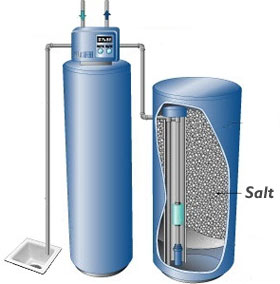
The secondary tank contains salt – also known as a brine tank. If you take a look inside of this tank, you will see that it contains very fine salt particles within. Located at the bottom of the tank, you’ll notice there is water and this water creates salt brine, which is ultimately what the tank is named after. Every few days the salt brine enters into the resin tank to clean out the hardened ions. The ions are flushed out of the system and go into your wastewater drain.Maintenance is very easy with this particular system. Add salt bags to the brine tank when needed. The resin itself is going to last for anywhere between 10 to 20 years so you will not have to replace it very often.The positive effects of this tank include the reduction of scale buildup, a need for less soap, plumbing lifespan extension, and a silky smooth feel when the water hits your skin. On the negative side, you may notice a bit of a salt water taste.
Non-Salt Water Conditioners

It doesn’t soften water at all, but it contains a cartridge with a magnet that realigns the ions inside the water source. Once the ions are realigned, they will repel each other. This is good because they’ll no longer build up around your sink, or cling to your faucet, and they will avoid the plumbing and other appliances as well.At the end of the day, this system ultimately leaves the magnesium and calcium in the water, but it prevents it from clumping together. So you’re technically not gaining protection from hard water, although this system reduces the negative consequences of having hard water in your home.
The descaler, on the other hand, is good because it eliminates problem contaminants like chlorine, chloramine, and other things that do not belong in your water supply. So, if you prefer to avoid salt water systems, this might be the best choice. And when it’s paired with a whole house water filter, it’s very efficient and can help remove many different contaminants.The positive effects of this water conditioning system include the prevention of limescale buildup and the removal of chloramine, chlorine, and other contaminants.
Dual Tank
The two biggest benefits of installing a dual tanks system means you’ll always have soft water on hand, and because it’s a heavy duty system it will be a scaled down version of a bigger industrial unit.The dual tanks system works just like your typical salt water softener. It runs on salt and resin, but the biggest difference is there are two tanks instead of one. So while one tank is regenerating, the other tank is still providing your home with soft water.The positive effect of a dual tanks system is soft water is always available even if the regeneration cycle is in process.
Magnetic Descalers
This device is very different than your typical water filtration system. It’s actually an electronic device instead of a water softener. And technically, you aren’t even going to install this system. You will connect wires and coil them around your pipes. Then you’ll plug in the device and it will create a magnetic charge. This positive effect of magnetic descalers is the system gets rid of the limescale so you will not have any buildup whatsoever.
Installation Process
Installing a whole house water softener is very similar to installing a water filter system. And the good part is this is relatively easy, although if you aren’t very handy it might be difficult and if that’s the case you should hire a professional to install it for you.Nonetheless, we’re going to share the steps to install the system below. If you’re looking to do it yourself please follow these instructions:
- Turn off your main water supply.
- Next, look for your inlet pipe – it should be somewhere in your basement or your garage.
- Third, you have to cut the pipe between your water meter and the part of the pipe where it’s about to enter your house.
- Fourth, you will attach your pipe connection at this stage. The connection will have three different valves.
- Fifth, check your connector to make sure it’s correctly installed. You may have to solder it to keep it firmly in place.
- Sixth, you now should connect the media tank directly to the brine tank using 3/8 inch plastic tubing which is usually provided with the system.
- Seventh, you can connect your drain line directly to your drain elbow at this time using a hose clamp.
- Eighth, you’ll have to connect your discharge pipe directly to the wastewater drain.
FAQ
How Much Does a Good Water Softener Cost?
The cost varies depending on the manufacturer, the type of softener used, and the quality of the machine itself. The best water softener is pricey but is also worth it. Homeowners can pay as little as $400 for DIY installation, with prices rising as high as $4,000 for a professional installation.
Are Water Softeners Worth It?
Although they can be expensive, they are worth the investment as softened water has a host of benefits. Water softeners can improve the efficiency of hot-water, plumbing, and heating systems. 1.6mm of scale buildup can cause a 12% decrease in heating efficiency.
How Long do Water Softeners Last?
As with all appliances, water softeners only last for a certain amount of time. Eventually, their components break down, electrical problems can occur, and they can stop working. Although they can last much longer if well maintained, they have a generic lifespan of between ten and fifteen years.
Final Thoughts
I hope you enjoyed our water softener reviews. Having looked at a range of products, we recommend the iSpring ED2000 as our best water softener. It’s efficient, cost-effective, compact, easy to install, noise-free, and chemical-free and popular. For those looking to spend a little extra for a more premium product, the Hansing Softener System is another excellent salt-free, whole-house water softening product.
